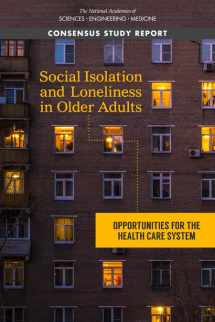
Social Isolation and Loneliness in Older Adults: Opportunities for the Health Care System
Book details
Summary
Description
Social isolation and loneliness are serious yet underappreciated public health risks that affect a significant portion of the older adult population. Approximately one-quarter of community-dwelling Americans aged 65 and older are considered to be socially isolated, and a significant proportion of adults in the United States report feeling lonely. People who are 50 years of age or older are more likely to experience many of the risk factors that can cause or exacerbate social isolation or loneliness, such as living alone, the loss of family or friends, chronic illness, and sensory impairments. Over a life course, social isolation and loneliness may be episodic or chronic, depending upon an individual's circumstances and perceptions.
A substantial body of evidence demonstrates that social isolation presents a major risk for premature mortality, comparable to other risk factors such as high blood pressure, smoking, or obesity. As older adults are particularly high-volume and high-frequency users of the health care system, there is an opportunity for health care professionals to identify, prevent, and mitigate the adverse health impacts of social isolation and loneliness in older adults.
Social Isolation and Loneliness in Older Adults summarizes the evidence base and explores how social isolation and loneliness affect health and quality of life in adults aged 50 and older, particularly among low income, underserved, and vulnerable populations. This report makes recommendations specifically for clinical settings of health care to identify those who suffer the resultant negative health impacts of social isolation and loneliness and target interventions to improve their social conditions. Social Isolation and Loneliness in Older Adults considers clinical tools and methodologies, better education and training for the health care workforce, and dissemination and implementation that will be important for translating research into practice, especially as the evidence base for effective interventions continues to flourish.


We would LOVE it if you could help us and other readers by reviewing the book
Book review



